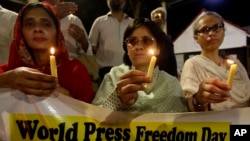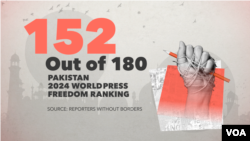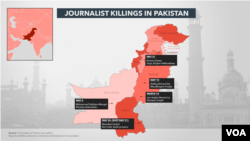The shadow of five journalist killings since the start of the year is hanging over Pakistan’s media.
Karachi-based journalist Amber Rahim Shamsi says the violence has created a sense of numbness among the country’s reporters.
"I don’t know if it’s about fear as much as normalization,” she told VOA. “That kind of numbness, to me, is more worrying than an open expression of fear.”
Of the killings so far this year, four took place this month, including a bombing in Balochistan province that killed journalist Muhammad Siddique Mengal. The deaths make May the deadliest month on record for journalists in Pakistan, according to the Committee to Protect Journalists, or CPJ.
The killings come amid increased risks for Pakistan’s already beleaguered media.
Also in May, watchdogs reported on two cases of reporters being disappeared; a press club raid in the city of Quetta; the detention of two reporters for objecting to the raid; and the passing by Punjab’s provincial government of a defamation law that critics warn could be used to stifle the media.
'Dissent is being criminalized'
“The space for freedom of expression is shrinking, and dissent is being criminalized,” Iqbal Khattak, the Pakistan representative for Reporters Without Borders, or RSF, told VOA from the capital, Islamabad.
Pakistan’s journalists already work under significant pressure. Despite a historically vibrant media landscape, watchdogs say that reporters are forced to walk a fine line because of the limited space for criticism of the country's powerful military and intelligence agencies.
The Inter-Services Intelligence agency in particular has for years been accused by rights groups of forcibly disappearing or even killing critical reporters.
Pakistan’s Washington embassy and Foreign Ministry did not reply to VOA’s emails requesting comment.
Some analysts say the recent surge in attacks may be a byproduct of the political turmoil that has gripped Pakistan since former Prime Minister Imran Khan was ousted two years ago.
“With political insecurity comes greater pressure on the media,” Khattak said.
Up until March of this year, no journalists had been killed in Pakistan since 2021. But the CPJ has recorded dozens of cases of journalists singled out for attack or killed on risky assignments since it started keeping track in 1992.
A lack of justice — or impunity — in targeted cases exacerbates the problem, experts say. Of the 37 cases where CPJ confirmed the journalists were directly slain for their work, 34 cases remain unresolved.
In Pakistan, impunity reigns when it comes to journalist killings because the government doesn’t care about holding the perpetrators accountable, according to Saroop Ijaz, who works on Pakistan at Human Rights Watch.
“Journalists are viewed as adversaries, as opponents,” Ijaz told VOA from Lahore.
Reporters and news outlets are also facing heightened pressure of legal threats.
Analysts are concerned by a defamation law that Punjab’s provincial government adopted earlier this month.
The law’s supporters say it will help combat the spread of disinformation.
But critics are concerned about the harsh penalties, including fines and the threat of entire outlets being shut down. They also warn of potential for abuse, with a coalition of Pakistani media organizations calling it a “black law” for press freedom.
On the surface, the law sounds like a good thing because it ostensibly aims to reduce the spread of fake news, according to Michael Kugelman, director of the South Asia Institute at the Wilson Center think tank in Washington. But in practice, the law will likely be used to target opposition voices, he said.
“Who makes the decision about what is fake news?” Kugelman said. “I fear that it can be used as a pretext to essentially go after anyone who happens to say or write or broadcast anything that happens to be inconvenient or critical.”
Under the law, court proceedings would also be kept secret, which journalist Munizae Jahangir said she finds concerning.
“Are these kangaroo courts? Are we going back to the times of martial law?” she told VOA from Islamabad.
Jahangir, who hosts the current affairs program “Spot Light” for the Pakistani news channel Aaj TV, serves as co-chair of the Human Rights Commission of Pakistan.
Chilling effect
The law may also compound self-censorship. Some red lines shift based on the political tides of the moment, according to Pakistani journalists and experts, but criticism of the country’s military and intelligence agencies, and of Islam, are understood to be off limits.
“Pakistan is really like a minefield,” Jahangir said. “You do not know what the no-go areas are. You do not know once you put your foot somewhere what’s going to explode, what’s going to happen to you next. You just have to figure it out.”
Shamsi, who has worked for outlets including the BBC World Service and Dawn, said she worries about the next generation of journalists in Pakistan. “They haven’t known anything else,” she said, referring to the poor press freedom landscape.
But she finds optimism in the robust history of resistance among Pakistani media in the face of severe safety threats.
Jahangir agreed. “We have to tell the truth no matter how high the price may be,” she said. “Journalists in Pakistan have always pushed the envelope.”








